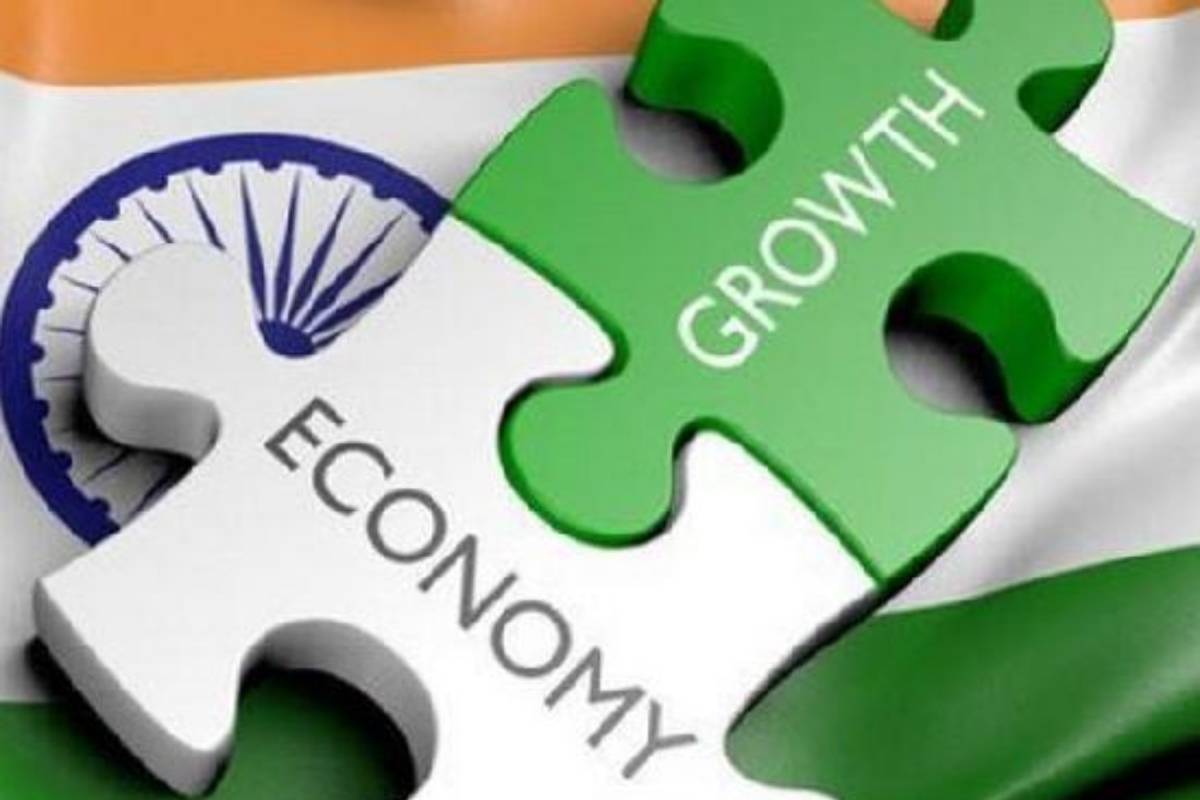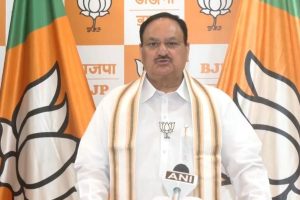To mark the occasion on the completion of nine years in office, the Bharatiya Janata Party (BJP)’s government came out with a nine-year big book — 9 years of Seva, Sushasan Garib Kalyan on Saturday.
In the book, the government has detailed its achievement on the lines of 14 important points, Serving the Poor and Marginalised; Ensuring Farmer Welfare; New Momentum For Nari Shakti; Empowering India’s Amritpeedhi; Ease of Living for India’s Middle Class; Affordable, Accesible Healthcare For All; Nation First- Foreign Policy and National Security; India, A Global Economic Powerhouse; Ease of Doing Business; Infra at Speed and Scale; India’s Techade; Northeast – A Growth Engine; Virasat Aur Vikas and Environment and Sustainability. In this context of economic development, the government has also written in detail on the topics — A Global Economic Powerhouse; Ease of Doing Business and Infra at Speed and Scale in the book.
As the global economy recovers from the aftermath of the Covid-19 pandemic, and the Russia-Ukraine conflict and struggles to find its feet, the Indian economy continues to break new ground, the government said in the chapter, titled A Global Economic Powerhouse.
In its latest projections on world economic growth, IMF recognises India as the fastest-growing major economy in the world.
The government mentioned the robust rise in GST collections, increase in capital expenditure outlay, and record growth in exports are indicative of a vibrant and growing economy that has recovered from the effects of the pandemic.
The book said, “This can be credited not only to the Modi government’s holistic approach to managing the economic fallout of the pandemic, but also to the consistent efforts since 2014 to strengthen the economy.”
The chapter also said that the structural reforms initiated by the Modi government have strengthened the Indian economy and enabled it to withstand the unprecedented effects of the pandemic.
To make India self-reliant in manufacturing, the chapter in the book also said the Modi government has initiated several programmes under Aatmanirbhar Bharat as well as Make in India.
This sector received further impetus with the Production-Linked Incentive (PLI) scheme. The objective behind PLI is to make domestic manufacturing globally competitive and to create domestic leaders in manufacturing. It said the PLI schemes have created lakhs of jobs and placed the Indian economy on a rapid growth trajectory.
In this chapter, it also mentioned that the Modi government has made MSMEs, a central focus of its economic policy. “The government’s Emergency Credit Line Guarantee Scheme during the Covid pandemic protected more than one crore MSMEs and saved them from possible permanent closure.
Moreover, reforms such as revision of MSME definition and changes in labour and environment laws have allowed MSMEs to expand their operations and grow,” it said.
According to the book, PM Modi had consistently assured the country’s wealth creators adequate support in their efforts towards innovation and making India self-reliant. This is reflected in his personal focus and support for the Indian Semiconductor Mission (ISM) and its vision of building a semiconductor and display manufacturing ecosystem in India.
India has also emerged as a preferred investment hub under Prime Minister Modi’s dynamic leadership with it recording its highest-ever annual FDI inflow of USD 83.57 billion in the Financial Year 2021-22, according to the chapter on economic development in the book, according to the book.
The Modi government has also announced a new Foreign Trade Policy to boost Indian exports, as well as to take India’s goods and services exports to 42 trillion by 2030.
The government said the Indian economy has seen a remarkable transformation in the last nine years, and its impact can be seen in the improved quality of life of all Indians across various sections of society.
In the chapter of Ease of Doing Business, the government said, “Today the world is looking at India as an attractive destination for investment and global companies want to establish businesses here.”
The book said, “One of the greatest examples of improvement in the business climate of the country can be seen in its startups. Before 2014, India had around 350 startups.”
It said over the last nine years, encouraged by schemes such as StartUp India, there has been a 260-fold increase in the number of startups. Moreover, the country today is home to over 100 unicorns.”
Since 2014, rent-seeking and red-tapism have been replaced by a red carpet, the chapter in the book said, adding that the government is not an obstacle in the path of risk-takers but is an active-enabler.
“Entrepreneurs and investors in India are now delighted by a business-friendly environment and a government that actively addresses their concerns and redresses grievances. This paradigm shift has been made possible through landmark decisions such as removing retrospective taxation,
and Angel Tax, and lowering corporate tax,” the book in the chapter said, adding, “The National Single Window System now allows obtaining all approvals through a single platform. Moreover, the Modi government has reduced unnecessary compliance burden by repealing more than 1,500 archaic laws and thousands of compliances.”
It said India’s efforts to improve the ease of doing business are being acknowledged on the global stage. “This is evident in consistent improvement in various international rankings. For instance, the country’s ranking in the World Bank’s Ease of Doing Business Index surged from 142 in 2014 to 63 in 2019,” the book said.
India has climbed six places on the World Bank’s Logistic Performance Index (LPI) 2023, now ranking 38th in the 139 countries index.
“This is a strong indicator of India’s global positioning, with this development being powered by the Government’s laser focus on reforms for improving logistics infrastructure through initiatives like PM Gati Shakti and new National Logistics Policy,” it said.
According to the book, the thrust towards greater transparency and a level-playing field for MSMEs and small businesses is exemplified by the success of the GeM portal, the government purchases through which have crossed Rs 4 lakh crore.
Apart from numerous reforms and landmark decisions, Prime Minister Narendra Modi has successfully led a mindset transformation, it said. “Unlike previous governments, the Modi government not only considers entrepreneurs as wealth creators but also as partners in national development.”
It added concerted efforts to improve the Ease of Doing Business have led to a historic expansion in the pool of wealth creators.
“This has had a butterfly effect on the country at large- it has increased resources available to the government for its welfare and development programmes, while at the same time enabling job creation, and higher incomes in the country,” it added.
In the book’s chapter on Infra at Speed and Scale, the government mentioned the quality of a country’s infrastructure is a key determinant in shaping its economic trajectory.
It said quality infrastructure is the key building block for our nation to become a global economic powerhouse. It said the Narendra Modi-led government has kept infrastructure at the front and centre of its development agenda. In the past, infrastructure projects suffered from inordinate delays, it added.
But in the last nine years, the book said, “Thinking big and delivering without delay have been the hallmarks of infrastructure development in the country. The Prime Minister has regularly monitored the progress of projects through the PRAGATI platform, which has led to the successful completion of various delayed, as well as newly announced infrastructure projects.”
In line with its goal of bringing last-mile connectivity, the book said, “the daily average highway construction reached an all-time high and has consistently remained far higher than pre-2014 levels. Similarly, a rapid increase in the construction of rural roads has made access to roads nearly universal in the hinterland. Indian railways also witnessed a massive capacity expansion in the last nine years through line doubling and electrification of railway tracks.”
The Vande Bharat Express, India’s first indigenous Semi High-Speed trains are a ‘Make in India’ success story, it added.
As for air travel, the steps taken by the Modi government, have made it affordable and accessible, the book said.
Seventy-four airports have been built and operationalised in just nine years, it said, adding, “further, 68 underserved/unserved destinations which include 58 Airports, 8 Heliports and two Water aerodromes have been connected under the UDAN scheme.”
Like airports, metro rail also is no longer limited to big cities. In the last nine years, metro rail projects have reached 20 cities, it had mentioned.
“In line with this, Prime Minister Narendra Modi announced the PM Gati Shakti National Master Plan (NMP) which is a transformative approach for integrated and holistic planning across concerned Ministries/ Departments to improve multimodal connectivity, logistics efficiency and to address critical infrastructure gaps for seamless movement of people and goods, with focus on minimising disruptions and ensuring timely completion of projects,” the book said.
“It is the most extensive plan for infrastructure development in the history of independent India, as the government plans to invest nearly Rs 100 lakh crore in the coming years.”
It concluded that Prime Minister Narendra Modi’s vision for infrastructure development will support India’s economic growth to the next level. “It will enhance the ease of living for citizens, multiply job creation and achieve the last mile connectivity to bring about inclusive development,” it added.











